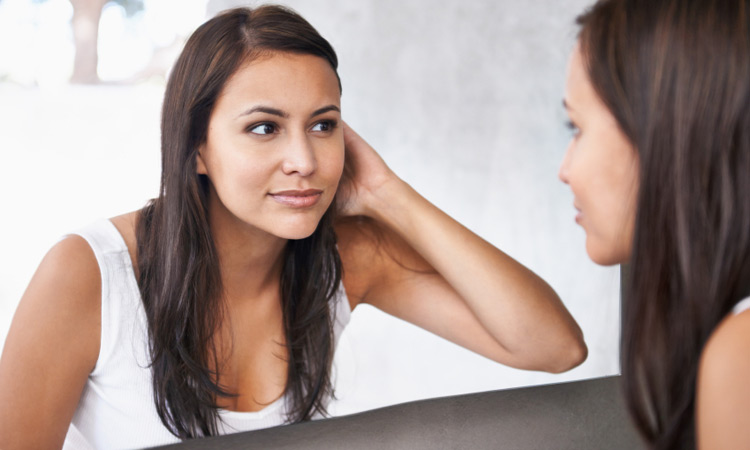 Airbrushed, perfect images of women and men in the media reinforce our ideas of what’s beautiful, and what’s not. The pressure to be thin, young and sexy seems to come from all angles. So much so that we may be objectifying ourselves when we look in the mirror.
Airbrushed, perfect images of women and men in the media reinforce our ideas of what’s beautiful, and what’s not. The pressure to be thin, young and sexy seems to come from all angles. So much so that we may be objectifying ourselves when we look in the mirror.
Mirrors are used to perform social grooming rituals and to check our appearance before we go out in public. We evaluate our image based on how it will look to others. Psychologists call this process self-objectification. It serves a very important social function as our appearance matters a great deal in how others respond to us.
But when we habitually look in the mirror to check and adjust how we look on the outside, we can also get in the habit of ignoring how we are actually feeling on the inside. We can disconnect from our authentic selves in favor of an image we believe we must maintain to be accepted by others. Researchers have found that self-objectification actually reduces our awareness of bodily sensations and emotions. We begin to see ourselves as objects rather than real people.
Focusing attention on our appearance also undermines our ability to maintain optimal states of awareness (or flow states) that are linked to intrinsic motivation and enjoyment in the present moment. Many women habitually compare themselves in the mirror with idealized images in the media, and this has been found to intensify feelings of shame and anxiety. By putting so much critical attention on ourselves, we actually create our own suffering.
In my research using mirrors as a meditation tool, we have discovered that the best way out of the pain of self-objectification is through it. How? By gazing at your image for longer than is naturally comfortable—10 minutes. As in traditional meditation, many thoughts arise as people sit with themselves. They are instructed to keep gazing at their image, letting their thoughts pass like clouds in the sky and are told that there is no way they can do it wrong.
Gazing at your own image can evoke strong feelings about yourself. The first layer of thoughts and judgments is usually those having to do with your appearance. As I watch people criticize their own appearance in the mirror, their eyes are often harsh and piercing, or they may space out and be unable to maintain eye contact with themselves. I ask them to soften their gaze and let go of any thoughts or judgments.
We’ve discovered that going through this process of gazing at yourself for an extended period of time has some great benefits. After 10 minutes of silent mirror gazing daily for eight times over a two-week period, participants reported a decrease in stress, anxiety and depression, and an increase in self-compassion.
Some have also said that they are more content with their appearance, began to wear less makeup, and no longer dread the mirror. Those who continued to do it daily reported an increase in concentration, better discernment in their relationships, and more overall enjoyment in life.
Try this simple exercise:
- Position a mirror so that it is freestanding and you can see into your eyes without straining or leaning forward, while you are sitting on a meditation cushion or on a chair with both feet on the ground. Set a timer for 10 minutes.
- Allow the weight of your body to be fully supported by whatever you are sitting on. Feel where your body is supported and how that pressure feels against your skin. Notice any places of tension or holding in your body and try to relax those areas.
- Begin to notice your breathing. Are you holding your breath or breathing rapidly? Take a few slow, deep belly breaths. Then breathe regularly and naturally, just observing your breath move your chest up and down.
- Begin to gaze into your eyes. Notice your gaze. Is it harsh or soft? Try to soften your gaze, taking your image into your eyes rather than reaching or grasping for it outside yourself. Stay with yourself in this soft gaze for as long as possible. If you notice yourself hardening by focusing on a detail or a flaw in your appearance, breathe until you feel yourself softening again. Gaze at your reflection, staying open to whatever arises. Notice any sensations or emotions that come up as you gaze and allow them to simply be there without judgment or interpretation. Let your feelings and thoughts simply pass by as you breathe, relax your body, and gaze at yourself.
Here are some questions for going deeper:
What labels do you use to describe what you’re seeing in the mirror? Physical appearance? Personality adjectives? Say these words aloud to yourself as you gaze at your image. How does it feel? Do you notice any shifts in your awareness?
Click here to find out about Rose’s thoughts on wellbeing and health



2 Comments